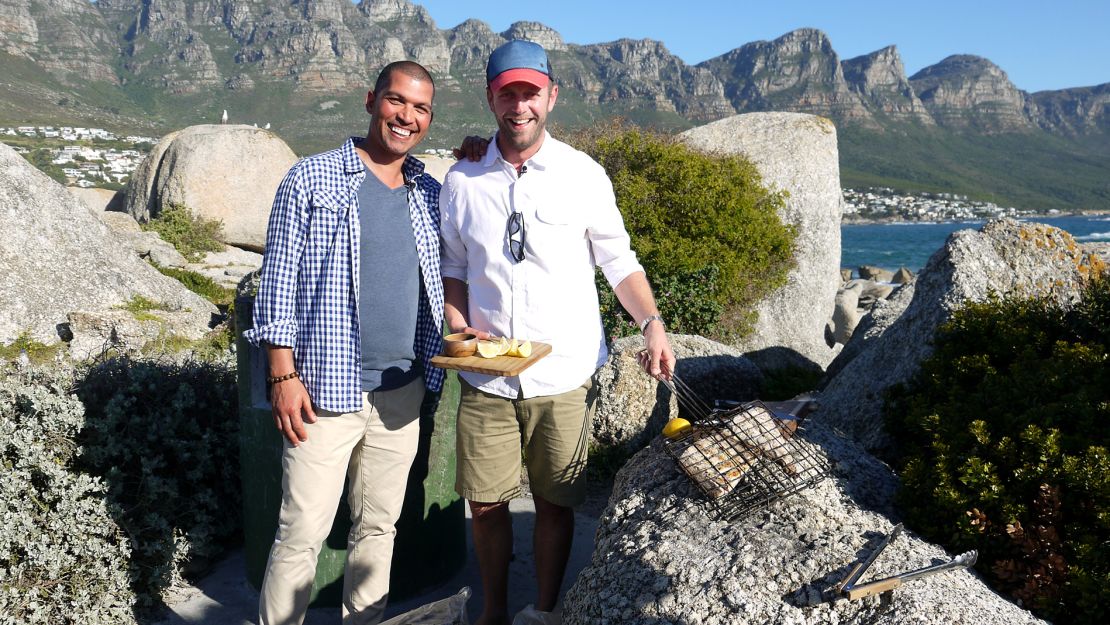Story highlights
Reuben Riffel is one of South Africa's best-known celebrity chefs
Riffel, who grew up in the last years of apartheid, says his food pays respect to the past
With top-rated restaurants, TV shows and a cabinet of culinary honors, Reuben Riffel is without doubt one of South Africa’s most successful celebrity chefs.
But that phrase “celebrity chef” doesn’t sit quite right.
Maybe because it conjures up a Gordon Ramsay-style persona, all screaming, pots slamming and tempers flaring.
In South Africa, Riffel is most popularly known as the face of local seasoning company Robertsons Spices.
In Robertsons’ TV commercials, he smiled as he talked viewers through making dishes that home chefs could actually prepare, and then hugged his children as they sat down for a family meal.
He’s the local boy made good who’d be fun to have a beer with around a braai barbecue.
And, it seems, it’s not an act.
He’s one of those people whose public persona rings true to the person underneath.
That’s because, he says, he’s spent a lot of time thinking about who he is, where he comes from, and how to incorporate that into the world of haute cuisine that he now inhabits.
MORE: The world’s most delicious national cakes
Cooking shaped by the years of apartheid
“It’s important to have a sense of, this is something I grew up with and I tasted it somewhere before… or my mum made it, or a friend, you know, because we get inspired from all angles,” Riffel says.
“I remember, in the beginning when I had the opportunity to design my own menu, that’s what it was about.
“It was about taking things that people eat every day and just change it slightly, maybe clean it up a little bit, maybe just have a completely different angle in terms of how it’s cooked.”
Riffel grew up during the final years of apartheid.
His mother worked in a restaurant, where he got his first exposure to tastes that he’d never experience at home.
He remembers in those early years that some foods were scarce, served only on the most important occasions.

Part of this sense of occasion was making use of the special kitchen skills of family members – an aunt with a knack for making cakes, a grandmother who baked bread.
“When I was growing up, food was important, but it wasn’t just about the food,” he adds. “For me and my family, it was about the people that cook the food, their approach to the people they were cooking for.”
Those memories inform his approach to cooking now – he looks for ways to respect the past, even though he now works in restaurants of incredible luxury.
Reuben’s, his Cape Town restaurant, is the flagship eatery at one of South Africa’s most expensive hotels, the One&Only (Dock Road, V&A Waterfront, Cape Town; +27 21 431 4511). He opened there when Ramsay’s Maze closed its doors in 2010.
“This restaurant here at the One&Only, initially the idea was to move away from the typical hotel fare that you get in hotels around the world,” he says. “Our style of food – I can almost describe it as rustic – focuses really on the ingredients.”
READ: Braai brotherhood: How BBQ brings South Africans together
Safeguarding his grandmother’s recipes
Cape Town occupies a particularly rich space for South African cuisine.
Just outside the city are vineyards, fruit orchards and farms.
With the Atlantic and Indian Oceans lapping at its shores, the city also has fresh and abundant seafood.
And it has a distinctive culinary history from the mixtures of African, European and Asian influences dating from the days when the city was an important stop in early global sea trade.
Dutch ships brought slaves from Malaysia, whose descendents have their own distinctive cuisine.
How best to manage those traditions is something Riffel wrestles with on his menus.
“I don’t feel comfortable to try and experiment with… certain recipes how my grandmother used to cook,” he says, even though the temptation is there to adapt or modernize recipes that have survived centuries in Cape Town.
“I always question whether we should try and do that. You have the clean, traditional type of food that you get in many restaurants in the Cape especially, and I think a lot of the chefs are feeling that sense of identity.”
“For us to be able to stand out, we have got to use what is local, not just in normal produce but also things that are part of our heritage, ingredients and produce.”
MORE: World’s 23 best cities for street food
‘Not your typical South African food’

As a result his menus aren’t filled with Cape Town staples like bobotie – a layered mince dish baked with an egg topping – or the curries and stews that dominate many Cape Malay restaurants.
Instead Riffel offers a taste of those flavors, with a bobotie-filled samoosa.
The rest of his menu is devoted to local ingredients, like mussels from nearby Saldanha Bay, trout from Franschhoek, and springbok steak for a bit of game.
They’re prepared with modern techniques and styles – he offers a chicken sous-vide with a pineapple and avocado salsa. All are popular ingredients used with a contemporary palate in mind.
READ: 5 African food bloggers you need to start following
“I wouldn’t say our food is your typical, traditional South African food. It’s a more modern South African type of food, probably drawing from a bit of our history and the ingredients we get, and international trends mixed into that,” he says.
Traditional foods, for Riffel, should retain a special place apart.
“We should always be able to have a traditional bobotie or anything like that, especially if you come to Cape Town,” he says.
“The traditional way these things were cooked, that is what I feel is our heritage and we should try and hold on to that and keep it.”
Griffin Shea is a writer based in Johannesburg, South Africa, where he also runs Bridge Books – an independent bookstore in an old, columnated bank building.
